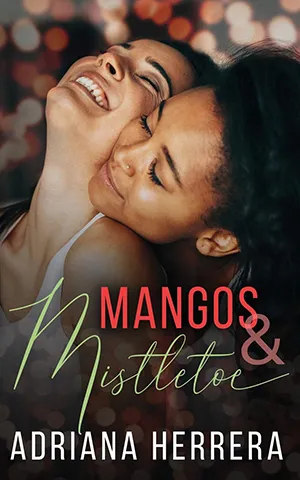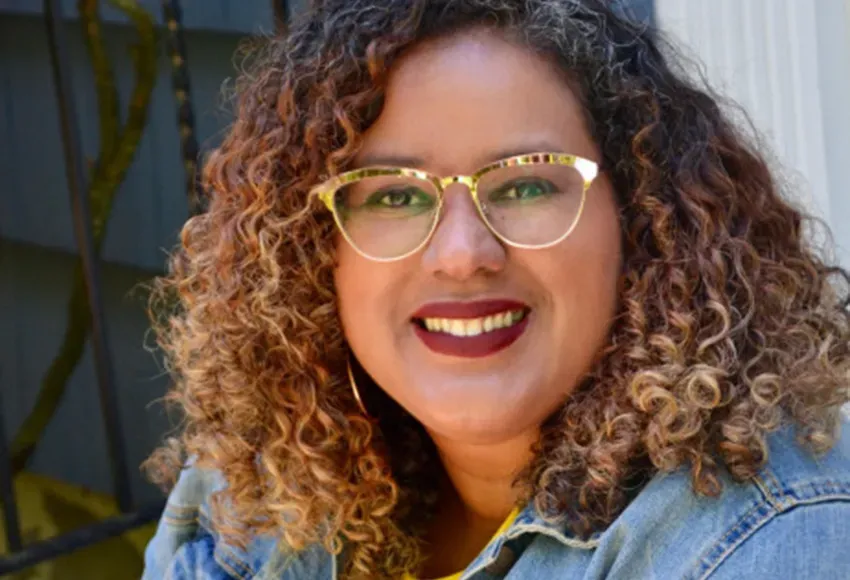What's a better holiday tradition than baking with friends and family? For author Adriana Herrera, cooking and the holidays go hand in hand.
Recently I sat down with her to talk about her food-inspired romance novel, Mangos and Mistletoe, her illustrious writing career, and all things Christmas.
"I just wanted to write a story set in the British Bake-Off world, because I love that show," Herrera laughed, referring to the inspiration behind her sapphic romance novel. "I set it in Scotland, because I had just been to Scotland the year before. My partner and I had been there two weeks before Christmas. It was so beautiful, and I thought that would be a good setting for a Christmas story."
Mangos and Mistletoe follow the adventures of two Dominican cooks forced to compete together in a Scottish baking contest. The novel is full of steamy scenes and mouth-watering recipes.
Despite having only started her career in 2019, she has already released nine books. "In romance, we tend to publish more than in literary fiction... This year I'll have two books come out, and I'll have a couple of shorts, a novella, and an anthology. My next full-length novel will come out in March, and that will be my ninth book since I started getting published in 2019."

Bringing sexy back
While she has penned several Queer romances, Mangos and Mistletoe is her only F/F story so far. Writing a story about women felt different to Herrera, and she admits that the genre seems to be lacking in some of her favorite M/M elements, particularly steamy scenes.
"You don't see a lot of F/F out there that is super high heat. M/M can be as sexy as possible, but for some reason, our sapphic stories out here are just not hot. To me, that's a mission. I'm writing these books as hot as possible. I like reading super sexy stories."
Writing sexy stories about women of color is empowering for Herrera and those who read her work. By defining her sexuality on her terms, she is reclaiming her body and showing the joy and beauty of it.
"People whose bodies in the past were commodified, oversexualized, objectified can be rendered differently in books. Like they have a partner who cherishes their body and wants to give them pleasure. They're understanding their pleasure. They get to have all that without being objectified or having that trauma come into it, to a degree."
Intersectionality in novels
Another ceiling she is trying to break through is normalizing romances starring women of color. "You don't often see sapphic books where both leads are women of color," she says. "With Mangos and Mistletoe, they're both Dominican, but they have very different stories: one is born in the US, the other... in the Dominican Republic, so their approach to their culture, how they see themselves is very different. I love exploring those."
Writing stories that represent her experiences and culture is essential for Herrera. "I think, for me, representation, in general, is important. The reason why I started writing romance was that, as a person of color, who is a Bisexual person, who is an immigrant, I found that I could only find, like, one side of myself in stories," she said of the lack of intersectionality in the romance genre. "I could find a Queer romance, but it was a cis white protagonist. I could find a story about immigrants, but it wasn't a Queer protagonist. I could find a Latin story, but it wasn't a Black Latina."
Eventually, she stopped looking for herself in the pages of books that continued to only represent a fragment of who she was. "I could only find snippets of myself in romance, and I've been reading romance for a long time. I've been reading Queer romance for a long time, and that was really like the impetus for me to decide to... try to become a published author. I wanted to see a full representation of who I am in books, and I didn't quite have it. LGBTQ representation, specifically in Latin characters, was important to me."
Now she writes her own romances, all of which include BIPOC and LGBTQ+ main characters. "Even when the characters present in a straight way, I think I'm writing Queer stories," she says. "One of the protagonists is Bi or pan, or the found family they have is fully Queer. Communities are fully represented in [my books]. I want to be mindful, and I want to write about my world. There are going to be people of all kinds of sexuality, desire, gender identity."
Speaking for herself
Herrera also believes that own voices are important when writing. That's why she puts pieces of herself and her identities at the core of all the characters she writes. All her main characters are Black or Latinx, two identities she holds. When she does write interracial relationships, she admits it's a challenge, but one she feels equipped to tackle since she is also in an interracial relationship.
However, she admits, it is difficult writing from the perspective of a white man. "I try not to be in the headspace of a white cis man as much as I possibly can," she joked.
Diversity in literature is very important, and Herrera is glad to see genres shifting to include different kinds of people. "I think there's been an ongoing conversation for a while now about the importance of having people of color, marginalized people, people who are neurodivergent, differently abled people, immigrants... I think it's all-important to establish that there is a value to their voices out there.
"One of the things I like to think I'm doing with my books is I'm from a different gaze. A book about a Latin person written by a Latin person, they're going to have a world view and a perspective for any reader that is going to impact them differently than if it was a story about a Latin person written by a white person."
Bringing her experiences to the page is beneficial, not only to other Dominican readers but to readers from all backgrounds, who now get a taste of what Dominican culture is like. "To me, gaze, and what we can do by bringing stories from our perspective and our world view, I think is valuable. There's an empathy-building piece of it that we need in the world."
She also notes that writing BIPOC stories about joy and love are vital, to share that marginalized experiences can be beautiful and triumphant. "It was also really important for me to write books about people of color that are not about our trauma. Like, it was important, specifically for Queer Latin people, it was important for me to write about us being in joy, finding it, and getting to have a 'happily ever after' without needing to be broken in the process. Just getting a 'happily ever after' that everyone else gets to have without giving up their humanity in the process.
"I appreciate the books that are out there giving people an understanding of larger and historical things. I also think that we deserve books that are not the learning books, the lesson books, the education books. We should be able to have books that are fun, frothy, escapist books, that are about our lives and joy."
Christmas traditions in the Dominican Republic
For Herrera, romance novels are a fun way to escape the mundane. Another fun way is with Christmastime celebrations. Herrera likes to celebrate the holiday with her partner and friends, but nothing beats her traditional celebrations with her family back in "the DR."
"I'm Dominican, so we usually do Nochebuena, which is Christmas Eve. It's a great meal, and then if I'm home, which I will be this year, it's not cold, it's nice and mild weather, and you have a ton of food. Everybody gets together, and it's just a nice family holiday."
Living in a Latinx family also means lots of delicious food around the holidays. "A lot of my favorite traditions revolve around food. Every Latin country has its kind of tamale, and we have one called pasteles, which is a tamale, but the masa, the batter we use, is made out of plantains. We fill it with ground beef or ground chicken. Usually, like a week before the holidays, we get together with family and make a ton of them. So usually it's like, you know, your aunts come over, your family comes over, and you make this big huge batch of batter, and everyone makes a ton of pasteles, and then we all take our pasteles for our dinners. That's always a nice tradition."
Herrera is excited to go home and visit with her family this holiday. One of her favorite Christmas activities in the DR is going to the beach. "It's always fun to go to the beach in the middle of the winter... From November to February is not as hot, and there are no mosquitos and humidity, so it's just the best weather."
But she has one special holiday wish before she leaves. Her ideal date would be a trip to the big city to see all the cold Christmas sights before heading home to the Dominican Republic for a relaxing day in the sun.
"I live in New York City, so going to Rockefeller Center and seeing the tree and [the] nice Christmas market in Union Square is fun, on a day that it's not super cold."
If you're looking for a fun way to escape the cold, dreary Seattle weather, warm up with a steamy copy of Herrera's Mangos and Mistletoe and read along with us in the SGN Book Club this week! As always, our book club can be found at https://www.instagram.com/sgn_books/.


